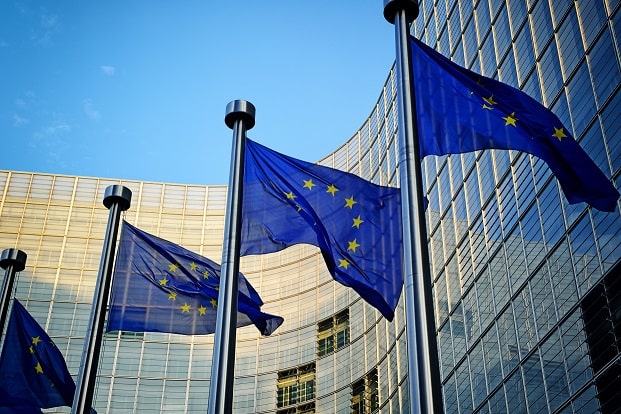An agreement on the Waste Framework Directive revisions with new recycling targets has been reached between the European Council and the European Parliament.
The breakthrough was achieved at extended meetings which finished in the early hours of this morning in Brussels. The agreed revisions, put forward by the European Commission as a series of options, form a major part of the Circular Economy package.
New recycling and landfill diversion targets have been set in the revisions although precise deals are unlikely to emerge until later this week. Extra time for landfill diversion targets are understood to have been agreed for some member states while recycling targets will be substantially above current rates of 50% by 2020 and will be set for 2025 and 2030 again with some country specific allowances.

A major agreement has been reached over future landfill and recycling targets
Estonian Presidency
The next step will be formal approval by member states which is now expected in the first quarter of 2018 with the likelihood that the deal will be ratified with little opposition following this weekend’s agreement. The deal was overseen by the Estonian authorities as the country currently holds the presidency of the EU.
The UK has already signalled that it will pass the proposals into UK law once it leaves the European Union as the revisions are linked to the Circular Economy package which is due to be approved within the EU before Brexit. And, the new recycling and revised Waste Framework Directive proposals are expected to form a central part of the forthcoming UK waste and resources strategy.
Clyde Kull, Estonia’s deputy permanent representative to the EU, said today (18 December): “We’ve just reached a provisional agreement with the European Parliament on the waste package… One of the biggest achievements of our Presidency, huge amount of work done by the team. We thank our partners and hope for Member States’ endorsement in January.”
Provisional agreement
The agreement, said the European Council, represents “a provisional agreement with representatives of the European Parliament on all four legislative proposals of the waste package. EU ambassadors will be briefed on the outcome on 20 December, but the final analysis and endorsement on behalf of the Council is planned for the first quarter of next year.”
The council explained that the agreed waste legislative proposals establish binding waste reduction targets and updated rules to decrease waste generation, ensure a better control of waste management, encourage the reuse of products and improve recycling in all EU countries.
In a statement it said: “These new targets and rules will promote a more circular economy. It will also boost growth and jobs, protect our environment, encourage sustainability and improve people’s health and well-being.”
Circular Economy
Siim Kiisler, Estonia’s Minister for the Environment of the Republic of Estonia, said: “In the EU, nearly a third of municipal waste is landfilled, with a limited share of the total being recycled. With this agreement, EU member states are committing to clear EU targets on reuse, recycling and landfilling and rules to improve the management of different waste streams.
“This will help accelerate our transition towards a circular economy and minimise our impact on the planet. I want to sincerely thank the previous Council presidencies, the Parliament and the Commission for their dedication to this file. I hope the member states can now endorse this well-balanced and thoroughly negotiated compromise.”

Siim Kiisler, Estonia’s minister for the environment, spoke of the new package helping minimise the impact on the planet
This provisional deal amends six pieces of legislation:
- Waste Framework Directive (considered the umbrella legislative act of the package)
- Packaging waste directive
- Landfill directive
- Directives on electrical and electronic waste, on end-of-life vehicles; and on batteries and accumulators and waste batteries and accumulators.
The key elements of the agreed text include:
- clearer definitions of key waste concepts
- new binding targets at EU level for waste reduction to be met by 2025 and 2030, and 2035.
- These targets cover the share of municipal waste and packaging waste recycling (with specific targets for various packaging materials), and also a target for municipal waste landfilled by 2035
- stricter methods and rules to calculate the progress made towards those targets
stricter requirements for the separate collection of waste, reinforced implementation of the waste hierarchy through economic instruments and additional measures for member states to prevent waste generation - minimum requirements for extended producer responsibility schemes. Producers under these schemes are responsible for the collection of used goods, sorting and treatment for their recycling. Producers will be required to pay a financial contribution for that purpose calculated on the basis of the treatment costs.
Ambassadors
Before further details are released, EU ambassadors are to be informed of the proposals. A spokesperson for the Council said the final analysis of the text will take place under the incoming Bulgarian presidency with a view to confirm the agreement.
After formal approval, the new legislation will be submitted to the European Parliament for a vote at first reading and to the Council for final adoption.
For the European Commission the package is seen as “an opportunity for growth, jobs and improving resource efficiency”.
Plastics
Next on the European agenda is plastics, another topic which the UK government is also involved in with environment secretary of state Michael Gove indicating that he plans action in early 2018.
Again, this is expected to follow the EU stance which is preparing its plastics strategy. This will address issues such as recyclability, biodegradability, the presence of hazardous substances of concern in certain plastics and marine litter.
The post Agreement over Waste Framework Directive revisions appeared first on letsrecycle.com.
Source: letsrecycle.com Waste Managment


